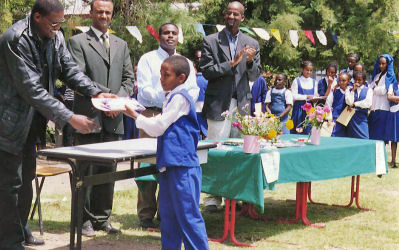Ethiopia; famine stricken

Today, Ethiopia remains one of Africa's poorest countries, with a very low income per capita - less than £6 per month - and a population that is almost two-thirds illiterate. Continuing food and water shortages are causing high levels of malnutrition, and the incidence of communicable diseases is rising. The already limited educational opportunities are being further disrupted by the displacement of families and the struggle for survival, taking away children's opportunities to acquire basic life-skills.
Aids Orphans in Ethiopia
Food and water shortages in Ethiopia have been followed by an increase in the incidence of HIV/AIDS. It is estimated that 4.4% of the population is affected, that 720,000 children were orphaned as a result of HIV/AIDS, 18% of all orphans, and that 200,000 children are living with HIV/AIDS (Source UNICEF).
The most affected regions are the southern and eastern parts of the country. This poses a big challenge not only to SOS Children but also to the government and other NGOs. Ethiopia is experiencing an increase in the number of street children and families from rural communities migrating to urban slums. Consequently, it does not have the capacity to care for the increased number of street children and street families. SOS Children in Ethiopia aims to increase the quality and quantity of its child care working with other NGOs.
In Keranyo, Addis Ababa, the SOS Medical Centre continues to grow. Volunteers have been trained in home based care for HIV patients. In addition, the SOS Social and Medical Centre project co-coordinator Tadesse Alemu has begun networking with other NGOs to increase the use of SOS Children's Villages resources. The networking includes monthly meetings where information can be shared and fed into a database so that resources are not duplicated. The database can provide the names of children and parents who would benefit from SOS Children's Villages services such as day care and home based care. The networking group is called 'Timret Le Hiwot' (Nation for Life).
Despite international co-operation, peace agreements and economic growth, the country is still being ravaged by the effects of HIV/AIDS. The most affected regions are the southern and eastern parts of the country. This poses a big challenge not only to SOS Children but also to the government and other NGOs. There is an increase in the number of street children, street families and of slums, which affects the ability to care.